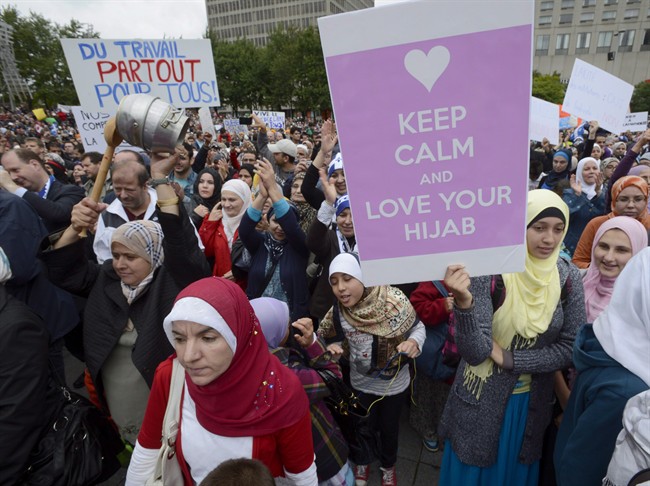MONTREAL — While Quebec’s population may have increased in 2013 by about 63,000, the total growth rate for the province has gone down for the fourth consecutive year.

According to the Institut de la statistique du Québec, which released its annual report on population statistics on Tuesday, this slow down was not because of a declining number of births and deaths (these remained stable last year), but were due to migration changes.
“The slowdown was due to changes in migration components, such as higher interprovincial losses and a decline in the number of immigrants,” the institute noted in a statement.
In 2012, the population increased by over 73,000 and the province’s population hit 8.18 million at the end of 2013 and reached 8.21 million on July 1, 2014.
Fewer immigrants coming to Quebec
Quebec welcomed 5,500 fewer immigrants to the province in 2013: about 52,000 compared to 55,050 in 2012.
READ MORE: Turbans, hijabs, kippahs face restrictions in Quebec
The top countries of origin were China, France and Algeria, followed by Haiti and Morocco. Nearly two out of three newcomers were aged 20 to 44.
More Quebecers headed west
In 2012, 8,7000 Quebecers left to live in another province, but in 2013, that number increased dramatically to 13,100 people, primarily leaving to live in Ontario (7,100) and Alberta (4,700).
READ MORE: 40% of all new jobs in Canada last year generated in Edmonton
“If the final data confirm these estimates, the losses experienced in 2013 would be the most significant since 1998,” the institute noted.
Life expectancy — of men — hits a new high
Women are living longer, but men are catching up. The life expectancy for men is now above 80 years of age, a threshold reached by women in 1989.
The gap between how long men and women lived for was nearly eight years in the early 1980s, but it’s now under four years.
The life expectancy of men reached 80.2 years in 2013, while that of women was 84.1 years.
The number of deaths in Quebec remained unchanged from 2012 at 60,800.
Birth rates continue downward trend
Continuing its downward trend, there were 100 fewer babies born in Quebec in 2013 than 2012 (88,600) and the total average fertility rate was 1.65 children per woman.
READ MORE: Quebec to impose patient quotas, cut fertility treatment program
For the first time in the province, the fertility rate was slightly higher among women aged 30 to 34 than those aged 25 to 29. According to the institute, this reflects the fact women are choosing to have children at increasingly older ages.
Marriage a low priority for Quebecers
Of the 23,200 marriages celebrated in Quebec in 2013, 600 were same-sex marriages (3 per cent of the total). Only 28 per cent of men and 31 per cent of women are expected to marry at least once before their 50th birthday.
Religious ceremonies were down, dropping below 50 per cent for opposite-sex couples. However there was an increase in civil marriages celebrated by a designated person.


Comments